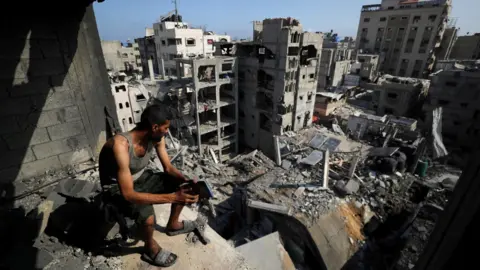In a significant development concerning the ongoing conflict in the Gaza Strip, Hamas has announced that it has provided a “positive response” to mediators regarding a proposed ceasefire plan and a hostages’ release agreement brokered by the United States. This announcement follows a sequence of discussions around a potential agreement, emphasizing Hamas’s readiness to engage in immediate negotiations, despite not yet formally committing to the proposal itself.
In a statement released by Hamas, the group’s leaders communicated their willingness to enter negotiations swiftly, underscoring their seriousness about resolving the ongoing strife. This clarification came on a day when former U.S. President Donald Trump conveyed expectations of receiving a response from Hamas within a short timeframe. He reiterated that Israel had already accepted the necessary conditions for a 60-day ceasefire, during which both sides would work to conclude the nearly two-year-long conflict.
The ceasefire proposal reportedly stipulates a staggered release of ten live Israeli hostages along with the repatriation of the bodies of eighteen deceased hostages in exchange for Palestinian prisoners currently held in Israeli facilities. It is important to note that as of now, fifty hostages remain captive in Gaza, with at least twenty of them confirmed to be alive. Within the framework of this agreement, Hamas has made it clear that one of its core demands is the restoration of unhindered food and medical supplies into Gaza. The proposal suggests that a significant amount of aid would reach the territory with the involvement of international organizations like the United Nations and the Red Cross.
Moreover, the deal would likely include a gradual withdrawal of Israeli military forces from specific areas in Gaza. One of Hamas’s principal demands is a guarantee that Israeli airstrikes and ground operations will cease following the expiration of the proposed ceasefire. This aspect of the plan is particularly crucial, as it lays the groundwork for future peace discussions by signaling an end to hostilities.
Following a potential positive response from Hamas, formal indirect negotiations could recommence, which would align with an impending visit by Israeli Prime Minister Benjamin Netanyahu to Washington. However, while diplomatic efforts unfold, the violence in the region continues unabated. Reports from the Hamas-run health ministry indicate that Israeli airstrikes have claimed the lives of at least 138 Palestinians in a 24-hour period, with significant casualties reported in various strikes, including one that targeted tents sheltering displaced populations in southern Khan Younis.
Personal stories emerging from the violence highlight profound human suffering. Thirteen-year-old Mayar al-Farr, mourning the loss of her brother, poignantly stated at his funeral, “The ceasefire will come, and I have lost my brother? There should have been a ceasefire long ago before I lost my brother.” Additionally, Adlar Mouamar, grieving the loss of his nephew, echoed the desires of many for the bloodshed to end, vocalizing a common plea for peace amidst the chaos.
The Israeli military maintains that its operations are intended to dismantle Hamas’s military capabilities, with no immediate comment provided on the ongoing strikes. In a distressing further incident, a member of the Red Cross reported being hit by a stray bullet while attending to patients in Rafah, with their condition being described as stable. Furthermore, a separate tragic event cited by the medical charity Médecins Sans Frontières (MSF) detailed an attack that left sixteen individuals dead as they awaited humanitarian aid in Khan Younis, further emphasizing the devastating effects of combat on civilians.
As tensions escalate, humanitarian organizations have issued alarming warnings regarding the dire conditions in Gaza, calling for an immediate halt to what they describe as systematic and deliberate starvation affecting the Palestinian population. The emergency coordinator for MSF highlighted the urgent need for intervention, stating, “This carnage must stop now.”
Parallel to these developments on the ground, family members of the hostages in Israel are rallying in Tel Aviv, urging leaders to negotiate a comprehensive deal for their safe return. They gather outside the U.S. embassy, expressing hope yet anxiety over the fate of their loved ones amid the ongoing conflict. With Israeli Prime Minister Netanyahu making commitments to ensure the return of all hostages while preparing for international negotiations, the quest for peace remains fraught with uncertainty, as the situation evolves. The Israeli military has thus far continued its campaign in response to the original conflict ignited by a Hamas-led attack in October of 2023, which claims that approximately 57,130 people have been killed in Gaza since the war began.










